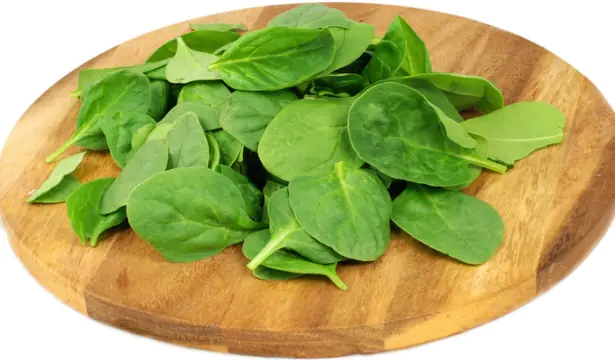Spinach is a versatile green vegetable. It is used not only in cooking, but also in cosmetology. Spinach paste applied to the face and eyelids can smooth out fine wrinkles in just 15 minutes.
100 grams of spinach contains:
- 2.9 grams of protein (larger amounts are found only in green peas and young beans);
- 410% of the daily value of vitamin K, which is responsible for increasing protein metabolism;
- 83% Daily Value of Vitamin A, a vision-healthy, anti-aging antioxidant;
- 10-20% of the daily value of biotin, which regulates protein and fat metabolism and is responsible for blood sugar levels;
- 40% daily value of vitamin C, which stimulates the immune system;
- 5-10% of the daily value of vitamin PP, which strengthens the heart muscle and normalizes sleep;
- 10-40% of the daily value of potassium, which prevents the appearance of cellulite, normalizes water balance and supports cardiac activity;
- 10% daily value of calcium, which strengthens teeth;
- 15% of the daily value of folic acid, which promotes the growth and development of the nervous and circulatory systems (especially useful for pregnant women).
Due to its high fiber content, spinach cleanses the stomach no worse than granulated cellulose. The ideal vegetable for diets contains only 23 kcal per 100 grams. Regular consumption of spinach leads to an increase in muscle performance by 5%. In addition, this herb helps normalize weight.
Spinach is good for the eyes, teeth, and heart. Spinach greens help lower blood pressure. Muscles and bones will also thank you for spinach salad.
The disadvantages of spinach are that it does not keep fresh well. Purchased greens should be used immediately, and the excess can be stored in the freezer - fortunately, when frozen, this salad retains almost all its benefits.
Spinach also contains a lot of oxalic acid. So it is contraindicated for people with urolithiasis, nephritis, rheumatism, gout, acute diseases of the liver, biliary tract and duodenum. It is not advisable to give it to children under two years of age.
So, spinach is a storehouse of useful substances, which, when consumed correctly, can improve health and prolong youth.



